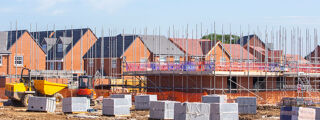In response to the new house building challenge set by government, academics at Birmingham City University's Centre for Future Homes have developed 12 new ‘Project 80 Eco Drive’ homes which meet the 2025 Future Homes Standard while those at the School of Engineering and the Built Environment have again called for a new strategy when it comes to smart metering.
The house building challenge
The new government have committed to building 1.5m homes in the next Parliament and to mandatory housing targets for local councils. Building new homes is a cost-effective way of growing the economy. For every £1 invested in constructing the UK economy will receive a return of £2.84. However, a major challenge will be to build homes which are affordable, sustainable and meet the Future Homes Standard. There are already 29 million homes in the UK which consume 14 percent of the country’s energy consumption. Building new energy-efficient homes and retrofitting existing ones is therefore a priority for meeting the UK 2050 Net Zero Target.
Project 80 Eco Drive
BCU has worked with Midland Heart Housing Association to pioneer Project 80 Eco Drive, the very first ‘at-scale’ demonstrator of the Future Homes Standard. This involved the sustainable development of 12 properties in Handsworth, Birmingham, which have achieved an 80% reduction in carbon. The homes have been occupied by tenants of Midland Heart Housing Association for 24 months and have produced a huge amount of data and occupier insights from sensors and interviews, across this multi-cultural development. They demonstrate the potential to build to new homes at scale, which are affordable and provide quality accommodation that is truly sustainable and meets the Future Homes Standard.
New strategy for smart home building
When it comes to building new homes, a Modern Smart Home can incorporate meters and sensors to record, monitor and optimise water, heat, and energy. Smart technologies like water and electricity meters are already widely available, but as some firms charge for them, the uptake has been limited. Other technologies such as Smart plug-ins, which can control lighting, and Smart built-in water heaters which use 15W instead of 600W to boil water are also available but currently are not being fitted as standard into new homes.
The Centre for Future Homes
BCU's Centre for Future Homes helps organisations explore robust, scalable and sustainable solutions to general housing issues using the latest academic research. Through using evaluating models and design tools, the Centre provides sustainable and cost-effective solutions.
Find out more about BCU's Centre for Future Homes.





